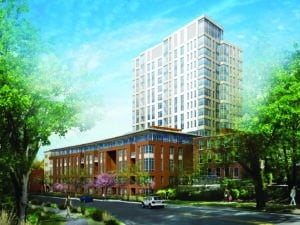
Housing watchdogs say corporate housing providers are seeking to exploit a loophole in Boston’s short-term rentals ordinance, which sought to keep non-resident investors out of the market. Churchill Corporate Housing leased 24 units in the new Serenity apartments at 101 South Huntington Ave. shortly after it opened in 2017. Image courtesy of PCA
Complaints about short-term rentals are resurfacing in Boston as the off-campus housing market and business travel recover from COVID downturns.
Removal of units from the traditional apartment market threatens to further drive up rents at dozens of de facto hotels that cater to college students, businesspeople and vacationers, housing advocates say.
“There’s been an ongoing challenge with executive suites and purportedly short-term business stay units that needs intervention by the city council,” said Ford Cavallari, chairman of the Alliance of Downtown Civic Organizations, an umbrella group of neighborhood organizations.
In January 2019, the city of Boston implemented an ordinance regulating short-term rentals, which was designed partly to prevent outside investors from renting out units in apartment and condo buildings. The ordinance also requires primary residents who rent out all or part of their dwelling for less than 29 days to sign up with a city registry.
But the ordinance exempts corporate housing units that require minimum stays of at least 10 days. As business and leisure travel rebounds, neighborhood groups and city councilors are warning of a potential loophole that will drive up rents and remove inventory from the traditional apartment market.
“The small landlords have abided by it and they’re registering,” said Richard Giordano, director of policy and community planning for the Fenway Community Development Corp. “The big guys like Sonder are trying to get buildings reclassified as executive suites.”
Councilors Ed Flynn and Kenzie Bok objected to the city Zoning Board of Appeals’ approval of 26 corporate housing units at 30-36 Batterymarch St. for San Francisco-based short-stay specialist Sonder. The Batterymarch decision also drew opposition from the Chinese Progressive Association, which said the corporate short-stay market is intensifying housing pressures on downtown Boston and Chinatown residents, and urged the ZBA to rescind Sonder’s permit.
Sonder also has applied for ZBA approval for corporate short-stay units at 103-111 Arch St. and 17-33 Winter St. In a statement, spokeswoman Kate Cory said “It is important to us that we operate in compliance with local regulations across all of our markets and we’ll continue to do so in Boston.
Objecting to corporate housing providers’ exemption from hotel regulations, ADCO asked that operators such as Sonder be required to obtain approval from the city’s licensing board. In an April letter, ADCO asked Acting Mayor Kim Janey to issue an order requiring 28-day minimum stays for corporate short-stay properties, defined as “executive suites” under the ordinance. Following Janey’s defeat in the preliminary election, the group is looking to Janey’s permanent successor for leadership, Cavallari said.
Regulations and Pandemic Depress Market
Mayoral candidate and city councilor Michelle Wu, who co-sponsored an amendment restricting outside investors from renting out units, predicted in 2018 that up to 4,000 housing units could be returned to the conventional rental market.
After a legal dispute with city officials, Airbnb agreed to share registration data from its web site with city officials and abutters. According the city’s annual short-term rentals report, listings of entire homes or apartments on Airbnb declined from 3,775 in November 2018 to 713 in April 2021. By June 30, the registry rebounded to 841 properties.
The recent uptick appears related to the recovery of business travel, in-person college classes and even the city’s busy construction climate, according to Lisa Timberlake, spokeswoman for the department of inspectional services.
The department has cited 20 properties in 2021 for violations such as failure to register or renting an ineligible unit, according to department data, compared with 35 in 2020.
Airbnb Strategy Prompts Discrimination Complaint
In the Fenway, affordable housing developers are asking the owners of a longtime roominghouse that embraced a short-term rental strategy in recent years to sell them the property.
Our Lady’s Guild House at 20 Charlesgate West was originally converted from a hotel into affordable lodgings for women in 1946 by the Archdiocese of Boston, and rents remained as low as $500 as recently as a decade ago, said Judy Burnett, a resident since 2008. In approximately 2014, the current owners hired Mark Roos Realty of Boston to manage the property and implement a series of rent increases, while converting some rooms into Airbnb units marketed to college students, said Cassie White, a community organizer for Fenway CDC. The property’s web site currently lists rooms starting at $810.

Steve Adams
The management team also announced a maximum 50-year age limit on residents, prompting investigations by the Massachusetts Commission on Discrimination and Attorney General Maura Healey. In 2019, the Massachusetts Commission Against Discrimination found probably cause that management discriminated by age and disability. Messages left with Mark Roos Realty were not returned.
While no charges have been filed by Healey to date, the Fenway CDC and Archdiocese of Boston’s Planning Office of Urban Affairs have offered to buy the property from the current owners, Daughters of Mary of the Immaculate Conception of New Britain, Connecticut.
“Our goal and intent would be to preserve it as affordable housing on a long-time basis and put deed restrictions on the property,” said Paul Grogan, president of POUA. “We’ve reached out to the current owner through their attorney but we haven’t been able to engage in a substantive conversation.”




 |
| 